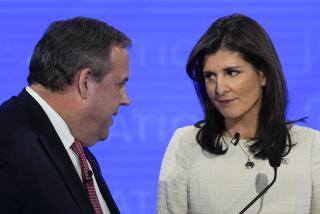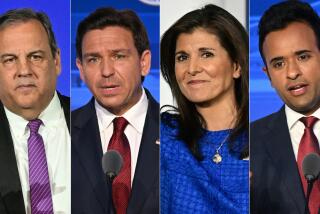Romney, Gingrich get testy in Florida
Standing face to face, Mitt Romney and Newt Gingrich traded barbs over honesty and integrity in an acrimonious debate that opened a fierce fight ahead of Florida’s crucial presidential primary.
After days of hurling insults long-distance and over the airwaves, the two wasted little time engaging in person Monday night, turning the opening exchange into a testy back-and-forth over who was more electable.
“They’re not sending somebody to Washington to manage the decay,” Gingrich said, reprising a line he has used before to belittle Romney as a passionless Mr. Fix-It. “They’re sending somebody to Washington to change it, and that requires somebody who’s prepared to be controversial when necessary.”
Romney, who was flattened by Gingrich in South Carolina’s primary Saturday, displayed the more pugnacious stance that he has adopted since his double-digit loss.
Presenting as a contrast his own experience building a fortune in the business world and helping rescue the 2002 Winter Olympics, Romney said repeatedly that Gingrich had to “resign in disgrace” from his job as House speaker.
“So we have very different perspectives on leadership and the kind of leadership that our conservative movement needs, not just to get elected but to get the country right,” Romney said.
A glowering Gingrich countered that Romney’s statements were studded with errors, and portrayed his departure as an act of sacrifice to atone for Republicans’ disappointing showing in the 1998 congressional election. “I think that’s what a leader should do,” he said.
Rep. Ron Paul of Texas, who served with Gingrich at the time, mocked that explanation.
“He didn’t have the votes,” Paul said. “That was what the problem was. So this idea that he voluntarily resigned and he was going to punish himself because we didn’t do well in the election, that’s just not the way it was.”
The debate, in the city where Republicans will install their presidential nominee in less than eight months, offered little new substance. But in going over well-furrowed ground, the candidates sharpened their attacks, reflecting the role Florida could play in either righting Romney’s richly-funded campaign or giving Gingrich the continued momentum he needs to challenge the former Massachusetts governor as the race spins into February and perhaps beyond.
Reflecting the dynamic, it was 15 minutes into the 90-minute session before a question was posed to a candidate other than Romney or Gingrich. Along with Paul, they were joined onstage by former Sen. Rick Santorum of Pennsylvania.
As part of his newly aggressive posture, Romney brought up an old issue: the work Gingrich did for Freddie Mac, the federally backed mortgage guarantor, which many Republicans blame for the housing meltdown. The attack could have particular resonance in Florida, where the real estate and construction industries, two mainstays of the economy, were flattened by the foreclosure crisis and housing tracts lay abandoned.
Gingrich’s consulting firm was paid more than $1.6 million by the mortgage giant — not to lobby, he adamantly insists, but to lend his perspective as “a historian.” Romney scoffed at that assertion.
“They don’t pay people $25,000 a month for six years as historians,” he said. Later, he brought up Gingrich’s work for healthcare companies. “I call it influence peddling,” Romney said. “It is not right.”
Gingrich had insisted early on that he would not spend the evening “trying to chase Gov. Romney’s misinformation.” But after visibly trying to keep his emotions in check, Gingrich boiled over. He said the debate had become “unnecessarily personal and nasty” and called Romney’s claim that he lobbied “defamatory and factually false.”
In a preemptive move shortly before the debate, Gingrich’s former consulting company released a copy of its 2006 contract with Freddie Mac. The document offered scant detail; just a single paragraph described the “scope of services and fees,” saying Gingrich’s firm was paid $25,000 a month but offering no explanation of the work that was done.
When moderator Brian Williams of NBC asked why there was not a more complete accounting, Gingrich said confidentiality issues needed to be resolved.
Facing questions about his own transparency, Romney announced after losing South Carolina that on Tuesday he would release his 2010 tax return and an estimate for 2011, ending several weeks of equivocating.
The Washington Post, offered a view of the returns by the campaign, reported after the debate that Romney claimed income of $21.7 million in 2010 and estimated $20.9 million in income in 2011. Almost all came from profits, dividends or interest from investments. His effective tax rate was less than 14% in 2010, the paper said, and just over 15% last year.
During the debate, Williams asked what surprises would be in store on the tax returns. “No surprises, Brian,” Romney replied. “You’ll see my income, how much taxes I paid, how much I paid to charity. You’ll see how complicated taxes can be. But I pay all the taxes that are legally required and not a dollar more.”
Under questioning, Romney defended his work as the co-founder of Bain Capital, the private equity firm that made him wealthy and also made him the target of Gingrich attacks for the job losses that resulted from some of its deals.
“I will not apologize for having been successful,” Romney said. “I did not inherit what my wife and I have, nor did she. What we have, what I was able to build, I built the old-fashioned way — by earning it, by working hard.”
The debate touched on a few issues of specific concern to Florida, notably relations with Cuba. The candidates were asked how they would respond as president to news that dictator Fidel Castro had died.
“First of all, thank heavens that Fidel Castro has returned to his maker,” Romney said, adding he would work aggressively with the new leadership to promote democracy.
“I don’t think Fidel Castro is going to meet his maker,” Gingrich replied. “He’s going to go to another place.”
Santorum was asked about his support for offshore oil drilling and the prospect of a spill hurting the state’s vital tourism industry. On the contrary, Santorum said, an oil production boom would be “the best way to create a good economy for the state of Florida.”
Romney’s allies spent several million dollars pounding Gingrich on the Florida airwaves even before Saturday’s South Carolina vote. Significantly, Romney joined the assault Monday with the first negative ad from his campaign, a spot asserting that the former speaker “cashed in as a D.C. insider” to benefit from the collapse of the housing industry.
Gingrich poured his limited resources into South Carolina. But hours before the debate, he received a huge boost with word that Las Vegas casino tycoon Sheldon Adelson and his wife, Miriam, were dispatching another $5 million to help his candidacy. The Adelsons’ first contribution, to a political action committee supporting Gingrich, was instrumental in his South Carolina victory.
But more than advertising, the debates — playing like a recurring reality show — have driven the Republican race, most recently in South Carolina.
In Florida, there was an added immediacy: Voting is already underway here, through the mail and at selected early-voting sites. The candidates are set to meet again, in debate No. 19, on Thursday night in Jacksonville.
Times staff writer John Hoeffel contributed to this report.
More to Read
Start your day right
Sign up for Essential California for news, features and recommendations from the L.A. Times and beyond in your inbox six days a week.
You may occasionally receive promotional content from the Los Angeles Times.








